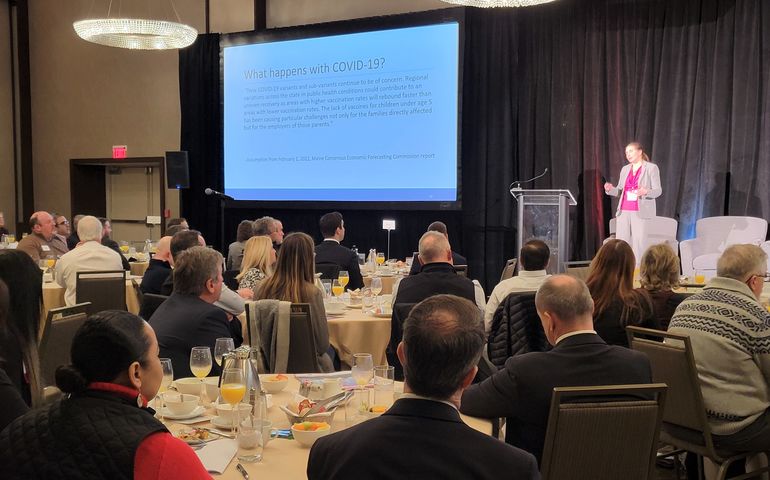Mainebiz '5 on the Future' panel sees critical fixes needed if state is to attract workers
 Photo / Alison Nason
An audience of about 150 listens to Amanda Rector, Maine state economist, at the Mainebiz "5 on the Future Forum," held Tuesday in Portland.
Photo / Alison Nason
An audience of about 150 listens to Amanda Rector, Maine state economist, at the Mainebiz "5 on the Future Forum," held Tuesday in Portland.
Maine faces a crisis of infrastructure in areas such as housing, child care, transportation and broadband that is keeping the state from attracting and retaining a more vibrant workforce, a panel of business leaders said Tuesday at a Mainebiz forum.
“How do we attract workers? It’s not just enough to say ‘Hey, Maine’s great.’ You need broadband access, places to live, child care, transportation and the interest and desire to develop those,” said Amanda Rector, Maine state economist, to an audience of about 150 at "5 on the Future" at the Westin Portland Harborview.
“We need all these things to have people move here,” Rector said. “The housing market has been ridiculous. Prices have risen very high, very very quickly. It’s a really, really big problem for attracting more people in the state. There’s no houses available.”
When asked by moderator Laurie Lachance, president of Thomas College, about the most important investments or policies to help industry thrive, the panelists hit on similar themes.
In the short term, Maine Tourism Association CEO Tony Cameron said, "Housing and transportation are key to fixing the labor shortage. Longer-term, Maine needs to look ask ‘How do we stay sustainable as a state? How do we develop without hurting the way of life?' People don’t like change,” Cameron said.
Cameron said the hospitality and tourism industries continue to suffer workforce shortages so great that 50% of those businesses will need to reduce their operating hours due to lack of labor. Additional visas for temporary foreign workers are necessary to draw more labor to Maine, he added.
Bristol Seafood CEO Peter Handy cited child care, education, addiction recovery and stimulus money as keys to helping businesses thrive.
“There’s a hole in the boat. We need to start solving these problems and coming up with solutions now,” said Cory King, executive director of the Southern Midcoast Maine Chamber of Commerce, asking the panelists for concrete ways to fix Maine’s big picture issues.
“We’re at the point of an existential crisis,” said Tom Landry, owner of Benchmark Real Estate in Portland. “If the hole has a boat in it, we need to start bailing it out or fix the hole.”
Landry pointed to communities such as Westbrook and Biddeford that are changing zoning to encourage more development and working with developers to get housing built. He also mentioned “common sense things” such as increasing the building height and density allowed in urban cores.
For example, the developers of the property that will house the Roux Institute, a graduate research and education center and business accelerator in Portland, are seeking a zoning change that would allow the construction of a 16- or 17-story residential tower on a new campus.
“I hope they get that,” Landry said.
“I don’t think the private sector needs help. Just remove the barriers,” Landry said, who said Portland’s rent control and the affordable housing Green New Deal ordinance have hampered business and housing development.
The business leaders also said they took unique approaches to hiring to attract and retain workers. Handy, for example, said some of Bristol Seafood’s workers came out of homelessness and addiction recovery.
“Mainstream recruiters have a narrow view. I hire moms who haven’t worked in 20 years. We say, ‘Let’s give this two years, we’ll train you on Excel and what you need to know.’ It’s a gold mine of talent,” said Jack Moore, managing partner and founder of Harpswell Capital Advisors. “We’ve done this 15 times since 2006.
“There’s so many kids who have never seen careers like finance or architecture. Creating and enhancing and helping aspirations are key. We’re really leaving a lot of talent on the table by not enhancing and supporting rural Maine."
Touching on other issues, Rector said she expects the pandemic to become more manageable this year. Some panelists weighed in, saying they see COVID-19 becoming less of an issue as early as this spring.
Other variables that remain volatile for the economy include inflation, interest rate hikes expected this year, and a softening consumer sentiment, Rector said.
“People are expecting not to feel as good in the future,” Rector said. “How people are feeling really impacts the economy.”
Nevertheless, the panelists were all bullish on the state's future.
"You often don't realize the time you're in when you're in it. We're in a time of a renaissance and tremendous growth," Landry said.
Mainebiz web partners
The Healthcare Purchaser Alliance of Maine is a non-profit organization created by and for employers and public trusts with the mission of advancing value in our healthcare system. We are hearing from our members that access to high-quality affordable healthcare in Maine is also a barrier to the attraction and retention of workers in Maine.
I believe childcare is one of the biggest hinderances to freeing up parents to join the workforce. Instead of wasting millions on Pre-K, schools should be funded to accommodate children being dropped off earlier than the normal start of classes. School staffing and facilities should also be expanded to provide afterschool programs allowing parents to pick them up after work.










2 Comments